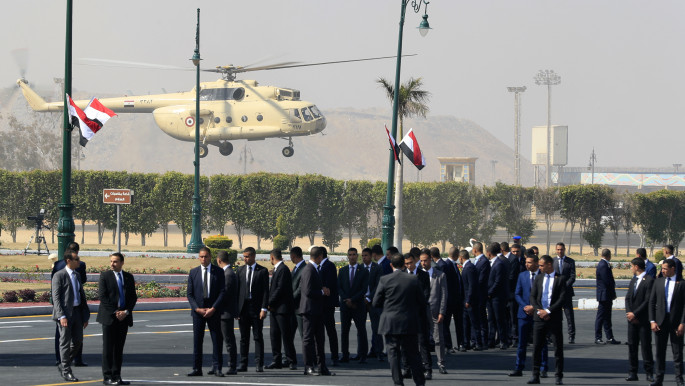Egypt holds full-honours military funeral for ex-President Mubarak 'under Emirati pressure'
A source from inside Egypt's government told The New Arab's Arabic-language service that Emirati officials called Egypt's leader, President Abdel Fattah al-Sisi, requesting that he hold a military funeral.
Ensuing calls from other Gulf Arab states, confirming the attendance of high-level figures from their nations to the ceremony, also pushed the Sisi regime to hold the full-honours funeral.
Mubarak, an autocratic dictator, was for decades the face of stability in the Middle East until he was ousted from power during the 2011 Arab Spring uprising that swept through the region.
A few dozen Mubarak supporters, clad in black and carrying posters of the former president, gathered in the early morning at a mosque complex in an eastern New Cairo neighbourhood, where Mubarak's body was brought for the funeral service.
The Republican Guard carried Mubarak's casket wrapped in the Egyptian flag.
| |
Egypt's interior ministry warned all local and foreign media not to send its delegates to cover the funeral ceremony, where only a small handful of accredited journalists were permitted.
Security forces shut down roads across New Cairo in the early morning, as the area was put on lockdown ahead of the ceremony.
The 91-year-old Mubarak died on Tuesday at a Cairo military hospital from heart and kidney complications, according to medical documents. He was admitted to hospital on 21 January with intestinal obstruction and underwent surgery, after which he was treated in intensive care.
Mubarak's rule of nearly 30 years ended after hundreds of thousands of young Egyptians rallied for 18 days of unprecedented street protests in Cairo's Tahrir Square and elsewhere in 2011, forcing him to step down.
Sisi attended the service, which was to be followed later in the day by burial at the cemetery in Heliopolis, an upscale Cairo district that was Mubarak's home for most of his rule and where he lived until his death.
Read more: Hosni Mubarak is dead, but the pharaoh state he helped build lives on
On Tuesday, Sisi extended condolences to the former president's family, including his widow Suzanne and two sons - wealthy businessman Alaa and Mubarak's one-time heir apparent Gamal.
In a statement, Sisi praised Mubarak's service during the 1973 war with Israel but made no mention of his rule as president.
The current Egyptian leader announced that three days of national mourning were to begin on Wednesday.
Pro-regime media paid tribute to Mubarak, focusing on his role in the 1973 war with Israel when Mubarak, a pilot by training, commanded Egypt’s air force.
 |
|
| A helicopter lands outside Cairo's Mosheer Tantawy mosque ahead of Mubarak's funeral [Getty] |
"Through his military and political career, Mubarak made undeniable achievements and sacrifices," eulogised the state-run al-Ahram newspaper in its editorial on Wednesday.
Obituaries in state media have barely diverged from the official statement of Mubarak's death released by the Sisi regime on Tuesday.
Born in May 1928, Mubarak was vice president on 6 October 1981, when his mentor, President Anwar Sadat, was assassinated by Islamic extremists while reviewing a military parade.
Seated next to Sadat, Mubarak escaped with a minor hand injury as gunmen sprayed the reviewing stand with bullets. Eight days later, the brawny former air force commander was sworn in as president, promising "continuity and order".
Mubarak's rule was marked by a close alliance with the US in the fight against Islamist militancy and assisting regional peace efforts.
Many older Egyptians, who had long considered him invincible, were stunned by the images of Mubarak on a gurney bed being taken to court for sessions of his trial in Cairo following his ouster.
Mubarak's overthrow led to a power vacuum, sparking a power struggle between the military and the Muslim Brotherhood group that he had long outlawed.
Some two and a half years after Mubarak's ouster, Sisi led the military overthrow of Egypt's first freely elected president, Morsi, and rolled back freedoms gained in the 2011 uprising.
In June 2012, Mubarak and his security chief were sentenced to life in prison for failing to prevent the killing of some 900 protesters during the 18-day uprising. Both appealed the verdict and a higher court later cleared them in 2014.
The following year, Mubarak and his sons were sentenced to three years in prison on corruption charges during a retrial. The sons were released in 2015 for time served, while Mubarak walked free in 2017.
Agencies contributed to this report.
Follow us on Twitter and Instagram to stay connected.



